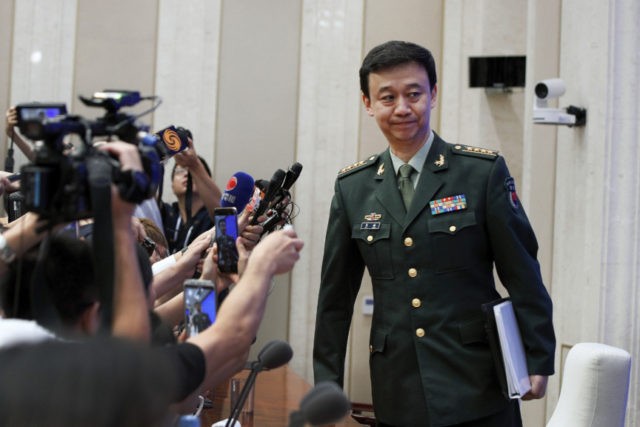China released a national defense white paper on Wednesday painting the United States as a menace to global stability, identifying Taiwan as the “greatest immediate threat” to Chinese national security, and raising the possibility of military action against “separatists” like the protesters in Hong Kong.
The defense report highlighted “separatists” in places like Tibet and the largely Muslim Xinjiang province as threats to Chinese national security but was especially vitriolic against Taiwan. The administration of Taiwanese President Tsai Ing-wen was accused of “pursuing a path of separatism” and “intensifying hostility and confrontation” by “borrowing the strength of foreign influence.”
“The PLA will resolutely defeat anyone attempting to separate Taiwan from China and safeguard national unity at all costs,” the report declared, referring to the People’s Liberation Army of China.
“If anyone dares to separate Taiwan from China, the Chinese army will certainly fight, resolutely defending the country’s sovereign unity and territorial integrity,” Defense Ministry spokesman Wu Qian said as the report was rolled out.
Taiwanese observers noted the new report was much more pessimistic and belligerent than the previous defense strategy paper from 2015, which insisted that “unification is a historical inevitability for the great renewal of the Chinese nation” but was optimistic about improving cross-strait relations.
“The Chinese Communist Party’s provocative behavior not only impacts cross-strait peace, it also seriously violates the peaceful principles of international law and international relations,” Taiwan’s Mainland Affairs Council said in response to the white paper.
Some foreign analysts speculated the obsessive focus on Taiwan in the report was a way for military leaders to signal to the Chinese Communist Party that more funding for modernization is needed. Chinese strategists tend to advocate technological parity with the vastly outnumbered defenders of Taiwan is essential to keeping the threat of military force against the island viable.
Malign American influence was a constant theme in the Chinese report, beginning with complaints about U.S. arms sales to Taiwan, denounced as one of the “wrong practices and provocative activities of the U.S.” Another American action viewed with great disfavor in the report was the deployment of the THAAD anti-missile system to South Korea.
The authors charged the United States has “provoked and intensified competition among major countries, significantly increased its defense expenditure,” and “pushed for additional capacity in nuclear, outer space, cyber and missile defense.”
At his press conference to introduce the paper, Wu Quian referred to the protests in Hong Kong as another separatist threat the Chinese military might soon feel obliged to address.
“The behavior of some radical protesters challenges the central government’s authority, touching on the bottom line principle of ‘one country, two systems.’ That absolutely cannot be tolerated,” Wu said, citing the passages in Hong Kong law that would allow its leaders to request Chinese military intervention.
Chinese state media’s coverage of the white paper stressed the allegedly modest level of China’s military spending and the defensive nature of its military strategy, as in Wednesday’s report from the Xinhua news service:
The white paper gave detailed information on China’s defense expenditure, described as reasonable and appropriate.
Compared to other major countries, the ratios of China’s defense expenditure to GDP and to government expenditure, as well as the per capita defense expenditure of the country, remain at a relatively low level, it added.
The white paper also devoted a section to explain Chinese military’s efforts and contribution to building a community with a shared future for mankind and fulfilling its international obligations as the armed forces of a major country.
China firmly believes that hegemony and expansion are doomed to failure, and security and prosperity shall be shared, said the white paper.
CNN noticed the report reflected Chinese Communist Party chief Xi Jinping’s increasingly tight grip over the military and Communist Party as it was filled with references to the “new era” of Xi’s ideology.
“Guided by Xi Jinping’s thinking on strengthening the military, China’s national defense in the new era will stride forward along its own path to build a stronger military,” read an example from the report’s concluding paragraphs.

COMMENTS
Please let us know if you're having issues with commenting.